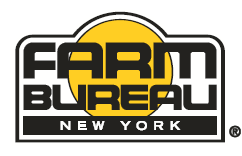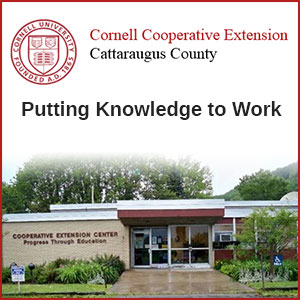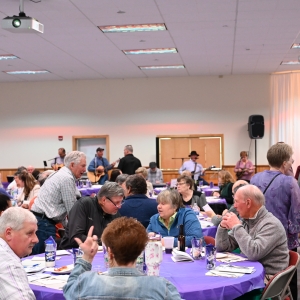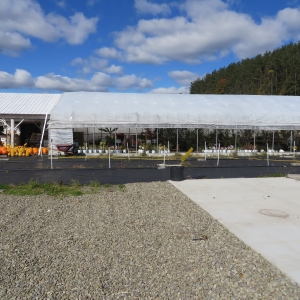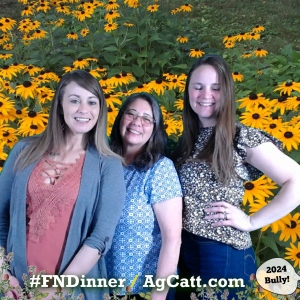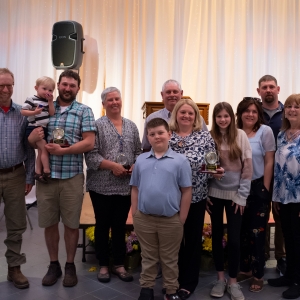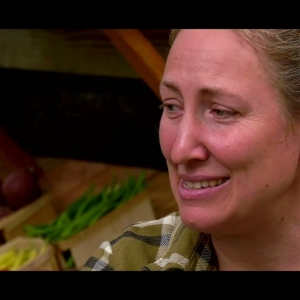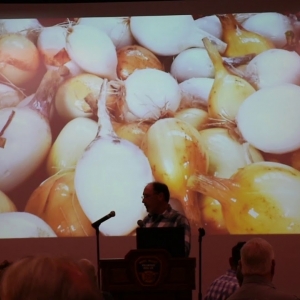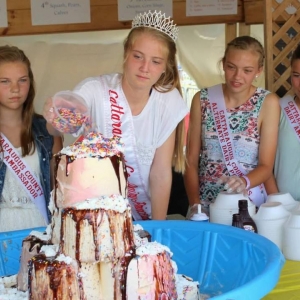Other Ag News:
If you’re selling 25 million trees, New York State is looking to buy. In 2024, Governor Kathy Hochul began an ambitious reforestation goal, aiming to plant 25 million new trees in the state before 2033. While the effort has been supported by policymakers, conservationists, researchers, and agriculturalists, a key issue remained — what kind of trees should NYS plant, and where should they come from? Small farms and nurseries across the northeast are getting involved, promoting robust native species.
On this week’s episode of Small Farms Radio, our Agroforestry and Mushroom specialist Connor Youngerman visited Jesse Marksohn at Yellowbud Farm tree nursery. They discussed how farms like Yellowbud can work to combat climate change and revitalize traditional foods from native species, one tree at a time.
Small Farms Radio · Episode 8 – The power of trees: Yellowbud FarmYoungerman describes New York State’s investment in forests like paying for a powerful machine: it eats up carbon, spits out food and building materials for humans to use, and simultaneously provides a home to wildlife that bolster the state’s biodiversity. Yellowbud’s wholesale seedling operation mimics this natural system, replacing synthetic fertilizers with Rich Earth Institute’s pasteurized urine, and a complex irrigation system with strategic mulching.
Marksohn believes that as New York State invests in its new forest “machine,” native species must be centered and further developed. Yellowbud is part of this effort to improve native cultivars; Marksohn’s team does archival research to identify successful legacy plantings, and connects with producers across the region to pilot new cultivars, measuring their performance for years before they begin wholesale production. The cultivars they develop are more resilient and have higher yields than seedlings imported from other regions, giving them an economic advantage in the short term but also ensuring longevity.
Beyond their importance in mitigating climate change, Marksohn believes trees can be “transformative” for a diverse range of agricultural operations across the region. For livestock producers, trees can offer shade and fodder, reducing heat stress and providing a resilient, perennial feed source. For vegetable operations, trees give natural patchy shade in the hottest months and protect crops from wind. Across the board, trees create habitat for beneficial biota, increasing biodiversity and potentially reducing pest pressure. For any operation, Marksohn recommends starting small and learning the basics of forestry.
Other than the environmental and economic benefits, Yellowbud also works to revitalize the cultural importance of foods from native trees. While hickory and oak trees are valued today for their wood, they historically were an important source of food. Along with the many environmental benefits of native tree production, products like hickory oil and acorn flour can be nutritionally and culinarily superior to alternatives like olive oil. Marksohn shares that hickory nuts are simple to process, and the resulting oil is higher in oleic acid (an omega-9 fatty acid) than olive oil.
With economic, environmental, and dietary advantages, the integration of native trees can be a triple-win for NYS. Youngerman believes that as New York builds its 25-million-tree forest machine, it’s more than worth it to invest in native species and the small farmers who produce them. Through partnership with conservationists and producers like Marksohn, New York can create a resilient tree landscape that will reap benefits for generations to come.
The post Small Farms Radio Shines a Spotlight on the Power of Trees appeared first on Cornell Small Farms.
(Washington, D.C., January 14, 2026) — Today, President Donald J. Trump signed the Whole Milk for Healthy Kids Act in the Oval Office alongside U.S. Secretary of Agriculture Brooke L. Rollins, U.S. Health and Human Services Secretary Robert F.
WASHINGTON, Jan. 14, 2026 - The United States Department of Agriculture (USDA) announced today that registration is now open for the 102nd Agricultural Outlook Forum. The event will be held at the Crystal City Gateway Marriott on Feb. 19-20, 2026, and all Forum sessions will be livestreamed on a virtual platform.
Would you like to navigate the impact of stress and intensity in your work and life more skillfully, with curiosity and compassion? Would you enjoy connecting with others from diverse backgrounds wanting to bring more conscious leadership to our work and lives?
Join educators, organizers, farmers, and earth-workers for an introduction to the practices of Leadership Embodiment at the beautiful Light on the Hill Retreat Center in Van Etten, NY. This workshop, held the weekend of February 28, is informed by the Japanese non-aggressive martial art of Aikido, mindfulness practices, and posture awareness.
Much of the effect we have on others is communicated non-verbally by our body language, tone and gestures. Some believe as little as 7% of our communication is conveyed by words. How we show up and the physical postures we hold are the key to lowering emotional reactivity, while increasing our power, resilience, and flexibility. Leadership Embodiment introduces participants to straightforward practices to effectively enhance our embodied leadership.
This 2 day, in-person workshop equips participants with tools that enable us to:
- Project a powerful, open, and expansive leadership presence.
- Create an inclusive space for collaboration and teamwork, especially in challenging situations.
- Receive feedback and listen from a place of open curiosity without taking the feedback personally, and
- Stand our ground and speak our truth in the face of pressure and resistance.
Leadership Embodiment practices are based on principles from the Japanese non-aggressive martial art of Aikido, mindfulness practices, and posture awareness. Through simple physical exercises that apply light pressure, you will learn to recognize your personal patterns that arise when you are in stressful situations. Once familiar with your unique pattern, we apply centering practices to help you shift to a more creative, inclusive, compassionate, and skillful state. Working with a partner, the learning exercises are examined step by step to create a lasting imprint in the body. Partner debriefs and group conversations create a dynamic, experiential, and supportive learning container. Participants will refine their personal declaration during the workshop and leave with a renewed commitment to offer their gift to the world.
Starts: Friday, February 28, at 4 p.m.
Ends: Sunday, March 1, at 1 p.m.
Location: Light on the Hill Retreat Center, Van Etten, NY
Cost: This program is normally offered at a registration cost of $400, with an additional $350 in food and lodging costs. However, thanks to *grant support, we are able to make this workshop retreat available for only $100. If cost is a barrier, please don’t hesitate to reach out for a full scholarship.
Apply here: This opportunity is open primarily to New York State. Space is limited to 25 participants. All participants are requested to attend a 45-minute virtual workshop orientation prior to the retreat.
Deadline: Application process closes January 30 or until filled.
Inner Light Lodge offers spacious, light-filled accommodations with panoramic views extending to Pennsylvania. Participants may request single or double occupancy rooms with shared bathrooms, or opt for a private cottage. The dining room looks out on the beautiful view and offers plenty of space for enjoying gourmet meals and meaningful conversation. The fully equipped commercial kitchen is stocked with healthy, organic, often locally grown food for vegetarian meals that feed the body and soul.
About the Workshop Hosts
Graham Hall, Instructor. Graham has been practicing Leadership Embodiment (LE) since 2007. In 2012 he attained his Leadership Embodiment Associate teaching certificate. He engages Leadership Embodiment practices as a foundation in his coaching practice to help his clients connect with their innate inner power and to manifest their hopes and dreams. Through use of LE practices such as shaping their declaration, clients manifest their unique gifts into the world. His interest in coaching and LE evolved from working on complex projects with extremely diverse communities to deploy new technology and processes for Cornell University. Leadership Embodiment practices have had a profound impact on his personal journey. Currently, he is transitioning from his 45 year career in Information Technology/Project Management to assisting others in their purposeful journeys via LE workshops and personal coaching. To relax and appreciate the abundance and beauty of nature he has a thriving, expanding dahlia garden (currently in hibernation in his basement!) He marvels and is inspired by the humble dahlia tuber. Each tuber bursts forth their stored energy when summer’s warmth returns. Graham experiments with new dahlia varieties which delight and support his passion for contemplative photography!
Damon Brangman & Amara Steinkraus, Special Saturday Evening Sound Healing Program. Sound Healing is an ancient practice using vibrations from instruments like singing bowls, gongs, and chimes, or the human voice, to promote relaxation and balance the body’s energy, aiming to reduce stress and anxiety by restoring vibrational harmony. Damon is a farmer/educator and musician and founded Roots Rising Farm to offer hands on garden education through school and community gardens. He has been on a personal healing journey since being diagnosed with Crohn’s disease. His passion for sound healing arises from wanting to assist others on their own healing journey. The earth is healing itself, and we play an important role in allowing the process to heal us, if we can only stop for a moment and listen.
Violet Stone, Workshop Coordinator. Violet Stone leads a wide range of retreats and workshops for the agricultural community drawing on themes of connection, wellness, purpose, integrity and courage. She sees this work as contributing to a more inclusive ‘culture’ of agriculture. In this highly technological age of automation and artificial intelligence, we have much to gain from the act of offering one another genuine listening, open-hearted attention, and wonder. Violet is a passionate life-long gardener, growing ever more appreciative for the beauty, joy, sustenance and healing that our non-human relatives so generously gift us. Violet has led programs for the Cornell Small Farms Program since 2007 and also serves as the New York Northeast SARE Professional Development Coordinator.
*This program is supported by the Equitable Farm Futures Initiative funded by New York State Agriculture and Markets and the Northeast Sustainable Agriculture Research and Education program under sub-award number SNE23-010-NY funded by the National Institute of Food and Agriculture, U.S. Department of Agriculture.
The post Rare Opportunity: Apply for Leadership Embodiment Workshop Held Late February appeared first on Cornell Small Farms.
(Anaheim, CA, January 13, 2026) – Yesterday at the 107th American Farm Bureau Federation Convention, U.S. Secretary of Agriculture Brooke L. Rollins announced expanded enrollment for 2026 Dairy Margin Coverage (DMC) program and new Section 32 commodity purchases that will result in more healthy, U.S. grown food in the hands of Americans.
(Washington, D.C., January 12, 2026) — The U.S. Department of Agriculture (USDA) today announced important leadership changes within the Animal and Plant Health Inspection Service (APHIS). Dr. Michael Watson, APHIS Administrator, will retire at the end of January after decades of distinguished service, and Dr. Rosemary Sifford, Deputy Administrator for Veterinary Services and U.S. Chief Veterinary Officer, has recently retired from federal service after a similarly notable career. Beginning on February 1, 2026, Ms.
(Washington, D.C., January 9, 2026) – Dr. Ben Carson, USDA National Advisor for Nutrition, Health, and Housing, and Dr. Mehmet Oz, Administrator for the Centers for Medicare and Medicaid Services (CMS), published an opinion piece in Newsweek outlining the actions the Trump Administration is taking to Make America Healthy Again through updating the Dietary Guidelines for Americans 2025-2030.
(Washington, D.C., January 8, 2026) – U.S. Secretary of Agriculture Brooke L. Rollins and U.S. Secretary of Health and Human Services Robert F. Kennedy Jr. published a joint opinion piece in Fox News highlighting the Dietary Guidelines for Americans 2025-2030, which call for Americans to eat real foods, including more protein, dairy, and vegetables, and reduce highly processed foods.
Editor’s Note: This post is a guest blog authored by Mia Keady, a Postdoctoral Research Associate in the Department of Soil & Environmental Sciences at the University of Wisconsin – Madison and is part of our ongoing series on USDA staffing. Her research focuses on soil health, land stewardship, and conservation incentives. She’s passionate about finding solutions to environmental degradation and understanding soil processes in response to land management. Mia grew up in Lincoln, Nebraska, where she was first introduced to the prairie. Her work spans grassland ecology, microbial ecology, and conservation biology. She completed her bachelor’s in biology at Nebraska Wesleyan, master’s in biology at George Mason University, and Ph.D. in Environment and Resources at the University of Wisconsin-Madison.
‘Conservation requires management’ was a key takeaway from my undergraduate studies; dispelling naive ideas about letting the land heal itself without stewardship. During my academic journey, I’ve learned how humans are a part of nature and have shaped ecosystems for millennia and that contemporary conservation solutions will likewise require human interventions. The last century and a half of tilling up the once rich prairie has depleted soils and created many environmental problems including declining surface and ground water quality, increased flooding, biodiversity loss, and contributing to climate change.
Recognizing this difficult reality, can we reshape the impact of modern agriculture? Can we steward our agricultural lands to protect and enhance ecosystem services? What can we learn from the prairies to inform our stewardship? What strategies advance perennial agriculture that builds soils, retains nutrients, and provides habitat if managed well?
My research addresses these questions by examining soil change in the once-prominent but now threatened prairies of Southern Wisconsin, the influence of federal conservation funding across the state, and the critical role played by staff at the Natural Resources Conservation Service (NRCS) and county conservation districts.
In this post, I will discuss the important role that perennial agricultural systems can play in supporting ecosystems and how perennial practices are supported by conservation staff, using Wisconsin as an example. My research shows that the number of NRCS and county conservation staff corresponds to federal conservation dollars spent in counties and that passionate and highly-skilled conservation staff are essential to supporting the adoption of perennial agricultural systems.
What can agriculture learn from prairies?Prairies provide key ecosystem benefits like clean ground and surface water, reduced flooding, critical habitat, and soil protection (Zhao et al., 2020). How can we mimic these benefits on farms? Perennial agricultural practices, including managed grazing of pasture, forestry, agroforestry, or grassland restoration, mimic the prairie ecosystem and bring many of these ecosystem services into agricultural systems. Peer-reviewed studies consistently show that perennial agricultural systems build or maintain soil organic matter, reduce nutrient and sediment runoff compared to annual row crops, and provide more resilient agroecosystems under climate stress (Culman et al., 2013; DeHaan et al., 2023; Dietz et al. 2024; Kreitzman et al., 2022; Mosier et al., 2021; Picasso et al. 2022; Soto-Gómez and Pérez-Rodríguez, 2022; Sprunger et al. 2024). Perennial agricultural practices that mimic the prairie ecosystem should be prioritized to maximize the environmental benefits of conservation investments.
Do conservation dollars support ‘prairie-like’ agriculture?Even though perennial agricultural systems deliver substantial long-term environmental benefits, my research finds that they receive only a small portion of the federal agricultural conservation spending in Wisconsin (Keady, 2025).
The US Department of Agriculture (USDA) administers voluntary, cost-share conservation programs to support farmers implementing conservation and nudge land management towards improved ecosystem services. The Environmental Quality Incentives Program (EQIP), administered by the NRCS, is the largest such federal conservation program in terms of total spending. To participate in EQIP, farmers and land managers work directly with NRCS staff and technical service providers to plan, apply for, and implement a range of approved conservation measures on private lands. In my research, I assessed EQIP spending from fiscal years 2014 through 2024 across Wisconsin to ask: Where do federal conservation dollars flow in Wisconsin and what influences where they go? In particular, I examined how much EQIP spending went to perennial agricultural conservation practices.
In Wisconsin, an average $29.7 million per year in EQIP support flowed to farmers in the 11-year period, with ~20% supporting agriculture that ‘acts like a prairie’ (that is, perennial practices including managed grazing of pasture, forestry, agroforestry, and habitat restoration), while ~60% supported interventions within annual row crop and livestock confinement systems such as cover crops and waste storage facilities (see full report here). The remaining 20% was used for multi-system practices such as heavy use areas, or practices that didn’t fall within these categories including dams and streambank protection. These results beg the question: is this the ‘best’ distribution of these dollars? Should we support interventions into systems well-known for environmental degradation to make them a bit less degrading, or should we invest in practices that help transform farms to perennial agriculture that ‘acts like a prairie’?
The Important Role of Conservation StaffMy research explored what county level factors shaped where EQIP dollars flowed. The strongest predictor of where EQIP dollars were spent was the number of conservation staff in a county, both federal and county employees (Figure 1) (Keady 2025). Local and federal conservation staff are critical to helping farmers access support for conservation practices. County conservationists in Wisconsin are members of Wisconsin Land and Water, also referred to as conservation district staff. Federal conservationists are NRCS field staff located within counties. Conservation staff work with farmers to find on-farm solutions and help navigate the application process (with grueling paperwork).Yet, NRCS staff has declined by over 30% over the past two decades, even before the devastating job cuts of 2025. In a time of intense environmental degradation, society desperately needs to support agricultural transitions to perennial systems that maintain soil carbon, produce food, and protect critical ecosystem services. Supporting well-trained and inspired conservation staff is critical to this equation.
Figure 1. NRCS staff (A) and county conservation district staff (B) correlate with the amount of conservation EQIP spending in Wisconsin counties.
How do we transform agroecosystems? Passionate and Skilled Conservation StaffTransitioning to perennial agroecosystems takes more than increasing conservation staff numbers, it also takes passion. Sauk County conservationist, Serge Koenig spent 30 years working with landowners, and the last 10 years inspiring and supporting transitions to managed rotational grazing. Serge sees grazing as the “most bang for your buck” – a financially viable farming option that provides solutions to environmental issues rather than interventions that slow the problem. His message has been convincing: Sauk County receives the most EQIP dollars in Wisconsin for grazing-related practices (Keady 2025). Serge credits this success to a combination of interpersonal skills, supervisory support, and most importantly – wanting to be the change. The interpersonal skills come naturally to Serge, but he’s adamant these are skills technicians can and should learn. Working with farmers requires “trust, sincere curiosity, and knowing when to listen, when to comment, and when to make suggestions,” he says. Supervisory support that encourages conservation staff to lean-in to their passion and expertise when working with farmers is key. Finally, conservationists want and need access to specialized training in grassland restoration, agroforestry, forestry, silvopasture, and grazing management. The heart of moving the needle towards perennial conservation comes from recognizing the ecological value of a perennial system and making it a priority to advocate for stewardship that makes our world a better place for farmers and society as a whole.
Perennial systems such as well-managed rotational grazing, forestry, and agroforestry can mimic the prairie in protecting and enhancing ecosystem services. Perennial plants protect soil, clean water, and provide habitat – and should be a key tool for conservation programs, including NRCS’s EQIP. Conservation staff are critical to working with landowners and getting conservation on the ground. We desperately need to support their passion and ability to advance land-management and provide benefits to both the farmer, land, and society at large.
The post Guest Post: Thinking like a prairie – strategies for perennial conservation appeared first on National Sustainable Agriculture Coalition.
(Washington, D.C., January 7, 2026) – U.S. Department of Health and Human Services Secretary Robert F. Kennedy, Jr. and U.S. Department of Agriculture Secretary Brooke Rollins today released the Dietary Guidelines for Americans, 2025–2030, marking the most significant reset of federal nutrition policy in decades. The new Guidelines deliver a clear, common-sense message to the American people: eat real food.
Pages
Signup for the Ag Newsletter
Get the freshest farm news, events and updates from in and around Cattaraugus County, NY at least once a month! Go signup!
Other ways to stay connected:
Get Involved in Farming
Resources for Starting a Farm in Cattaraugus County
Profile of Cattaraugus County soils
Agriculture Career Exploration
Questions about farming? Find out Who to Call

